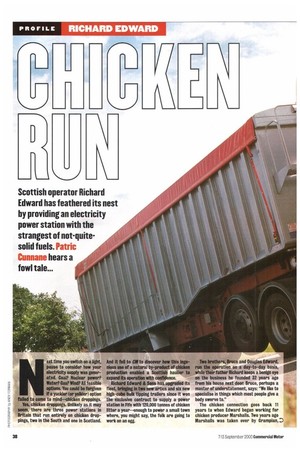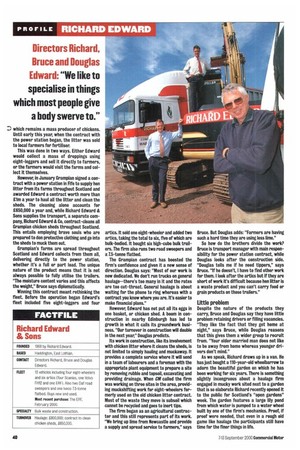N ext time you switch on a light, pause to consider
Page 40

Page 42

If you've noticed an error in this article please click here to report it so we can fix it.
how your electricity supply was generated. Coal? Nuclear power? Water? Gas? Wind? All feasible options. You could be forgiven if a yuckier (or yolkier) option failed to come to mind—chicken droppings. Yes, chicken droppings. Unlikely as it may
seem, there are three power stations in Britain that run entirely on chicken droppings, two in the South and one in Scotland. And it fell to CM to discover how this ingenious use of a natural by-product of chicken production enabled a Scottish haulier to expand its operation with confidence.
Richard Edward & Sons has upgraded its fleet, bringing in two new optics and six new high-cube bulk tipping trailers since it won the exclusive contract to supply a power station in Fife with 120,000 tonnes of chicken litter a year—enough to power a small town where, you might say, the folk are going to work on an egg. Two brothers, Bruce and Douglas Edward, run the operation on a day-to-day basis, while their father Richard keeps a benign eye on the business he founded 32 years ago from his house next door Bruce, perhaps a master of understatement, says: We like to specialise in things which most people give a body swerve to."
The chicken connection goes back 11 years to when Edward began working for chicken producer Marshal's. Two years ago Marshal's was taken over by Grampian,:; which remains a mass producer of chickens. Until early this year, when the contract with the power station began, the litter was sold to local farmers for fertiliser.
This was done in two ways. Either Edward would collect a mass of droppings using eight-leggers and sell it directly to farmers, or the farmers would visit the farms and collect it themselves.
However, in January Grampian signed a contract with a power station in Fife to supply hen litter from its farms throughout Scotland and awarded Edward a contract worth more than Elm a year to haul all the litter and clean the sheds. The cleaning alone accounts for £650,000 a year and, while Richard Edward & Sons supplies the transport, a separate company, Richard Edward & Co, contract-cleans all Grampian chicken sheds throughout Scotland. This entails employing brave souls who are prepared to don protective clothing and go into the sheds to muck them out.
Grampian's farms are spread throughout Scotland and Edward collects from them all, delivering directly to the power station, whether it's a full or part load. The unique nature of the product means that it is not always possible to fully utilise the trailers. "The moisture content varies and this affects the weight," Bruce says diplomatically.
Winning this contract meant rethinking the fleet. Before the operation began Edward's fleet included five eight-leggers and four artics. It sold one eight-wheeler and added two artics, taking the total to six, five of which are bulk-bodied. It bought six high-cube bulk trailers. The firm also runs two road sweepers and a 7.5-tonne flatbed.
The Grampian contract has boosted the firm's confidence and given it a new sense of direction. Douglas says: "Most of our work is now dedicated. We don't run trucks on general haulage—there's too many in it and the rates are too cut-throat. General haulage is about waiting for the phone to ring whereas with a contract you know where you are. It's easier to make financial plans."
However, Edward has not put all its eggs in one basket, or chicken shed. A boom in construction in nearby Edinburgh has led to growth in what it calls its groundwork business. "Our turnover in construction will double in the next year," Douglas predicts.
Its work in construction, like its involvement with chicken litter where it cleans the sheds, is not limited to simply hauling and muckaway. It provides a complete service where it will send in a team of labourers and a foreman with the appropriate plant equipment to prepare a site by removing rubble and topsoil, excavating and providing drainage. When CM called the firm was working an three sites in the area, providing muckshifting work for eight-wheelers formerly used on the old chicken litter contract. Most of the waste they move is subsoil which cannot be recycled and goes to inert tips.
The firm began as an agricuitural contractor and this still represents part of its work. "We bring up lime from Newcastle and provide a supply and spread service to farmers," says Bruce. But Douglas adds: "Farmers are having such a hard time they are using less lime."
So how do the brothers divide the work? Bruce is transport manager with main responsibility for the power station contract, while Douglas looks after the construction side. "Douglas tells me if he need tippers," says Bruce. "If he doesn't, I have to find other work for them. I look after the artics but if they are short of work its difficult because hen litter is a waste product and you can't carry food or grain products on those trailers."
Little problem
Despite the nature of the products they carry, Bruce and Douglas say they have little problem retaining drivers or filling vacancies. "They like the fact that they get home at night," says Bruce, while Douglas reasons that this gives them a wider group to recruit from. "Your older married man does not like to be away from home whereas younger drivers don't mind."
As we speak, Richard draws up in a van. He has just bought a 110-year-old wheelbarrow to adorn the beautiful garden on which he has been working for six years. There is something slightly incongruous about a haulage firm engaged in mucky work sited next to a garden that is so elaborate Richard recently opened it to the public for Scotland's "open gardens" week. The garden features a largo lily pond from which water is pumped to a water wheel built by one of the firm's mechanics. Proof, if proof were needed, that even in a rough old game like haulage the participants still have time for the finer things in life.
















































































































